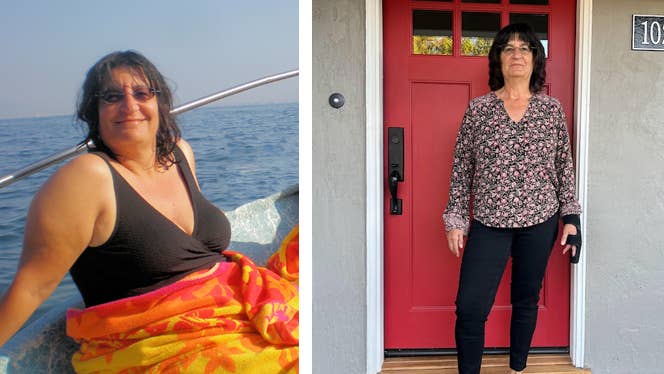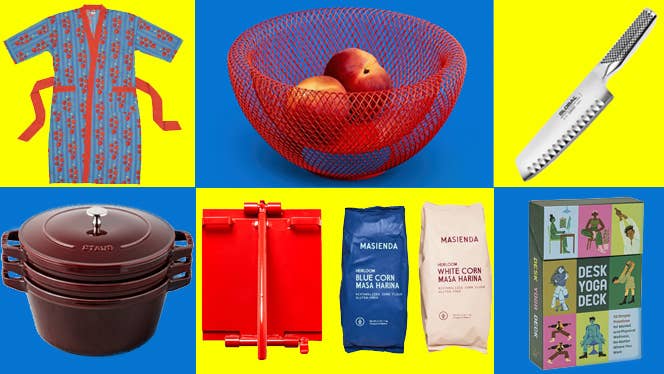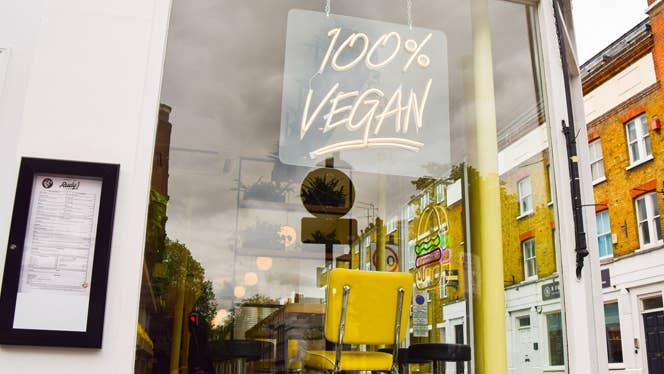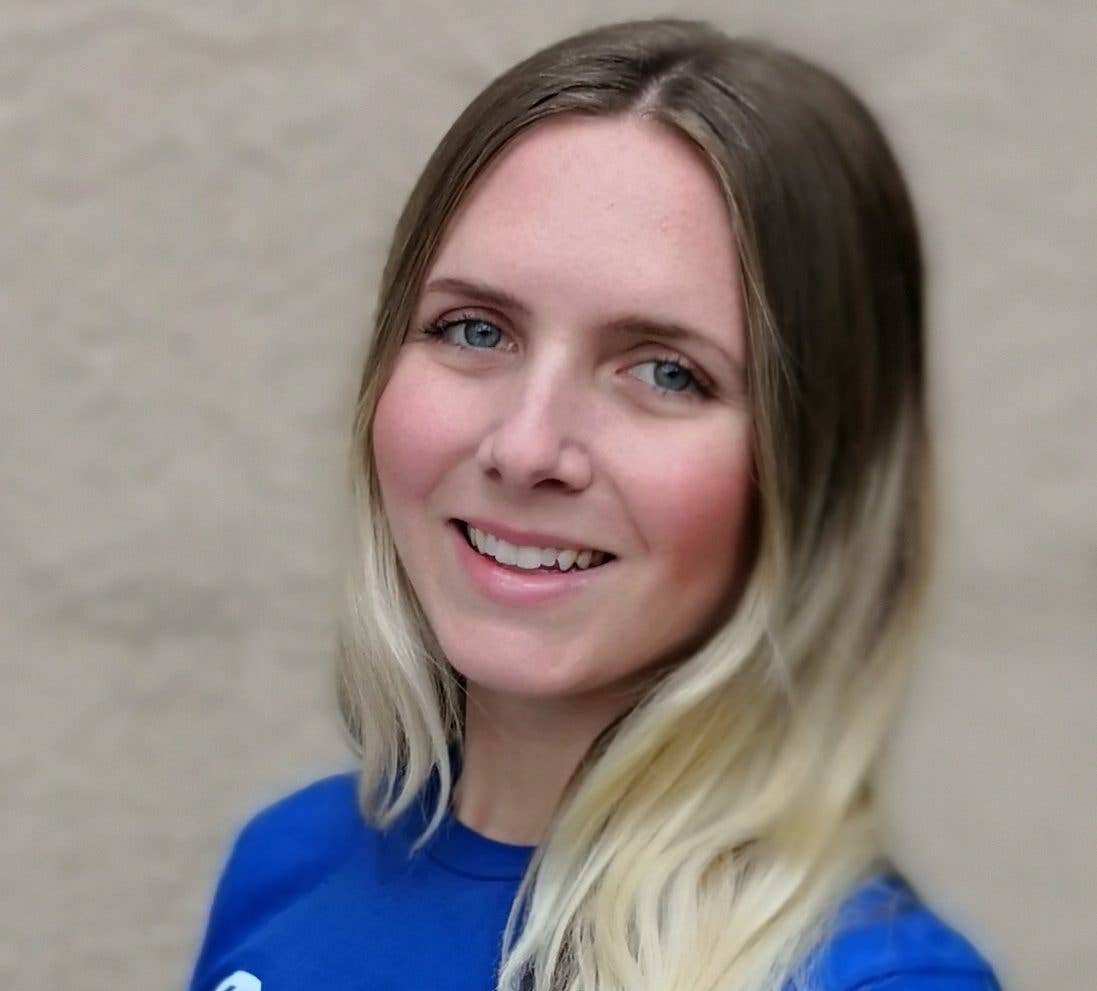On May 6, 2011, Forks Over Knives premiered and introduced millions to a simple yet striking idea: For some of the most common chronic diseases afflicting people today, diet is not only the primary cause but also the most powerful solution.
In honor of the film’s 10th anniversary, we spoke with the cast and crew about their memories of the making and debut of the indie documentary and their impressions of its legacy today.
I.
The Seed
In 2008, Brian Wendel was working in real estate when he attended a lecture and first heard of the book that would soon change the course of his life and career: The China Study.
Brian Wendel, creator and executive producer: I saw the book on a table at my friend Steve Mittleman’s house a couple of months later, and he let me borrow it. I flew through it in just a couple days. It blew my mind. I’d been plant-based for seven years at that point, and I understood the concept that eating the right foods was important to health. But that took my awareness to another level, prompting me to dive even deeper. It got me on an obsessive track, really—like, hey, we need to get this information out there: There is really strong evidence that many chronic diseases need not dominate our lives the way they do.
At one point I thought about going back to school to study nutrition. But then it came to me that the best way to get the word out there would be a film. A visual presentation could be more impactful than anything in writing. I asked my friend and business partner Ken Sheer if he knew any people in Hollywood who made documentaries, and he pointed me to [producer] John Corry.
The core crew (from left): John Orfanopoulos (camera, editing), producer John Corry, executive producer Brian Wendel, co-producer Allison Boon, and writer/director Lee Fulkerson.
II.
"I Can’t Believe This Is True"
Wendel, who was new to the world of filmmaking, set out to put together an experienced crew who could help develop and realize his idea for a documentary.
John Corry, producer: The first time Brian and I sat down and had a discussion was at a sports bar, during a Jets game. If you’ve ever met Jets fans, [you know] they're a desperate group of people. So we waited until half time and Brian explained [the concept for the film] to me, and he asked if he sent me a book would I read it and consider it. It was The China Study.
Wendel: I gave him a bunch of other books, too. He emailed me a few days later and said, “This topic is just too vast. I’m not in, man.” I thought, OK, I’m going to go find someone else. But then John kept coming across articles and kept sending them to me. He finally said, "You know what? I changed my mind. I think there's really something here."
Corry: I had two thoughts: One, I can’t believe this is true. Secondly, why have I not heard about this before? I’d spent some time in China previously, and I started seeing how it could all come together. So I said yes.
Lee Fulkerson, writer, director, and narrator: I got involved through my [collaborator] John Corry, who said very little about it—just that he knew somebody who wanted to do a movie about a healthy diet and that I should come over and meet with the guy, and have dinner with him. Of course, in my mind, the idea of doing a movie about a healthy diet didn’t sound like something that would set the house on fire. It was a chance for a free meal, which I never turn down, and it was a chance to meet somebody new… so I tagged along with John, and went to see Brian.
Brian [who ate mostly raw during that time] made us a three-course meal, and I remember the second course was cherry tomatoes. If there's one thing I cannot stand, it is tomatoes. But I felt a connection with Brian, despite that. We had this wonderful meeting of the minds about doing this film, doing it science-based. That was the thing that got me—the science was so damn convincing. I was in, 100 percent. John asked me afterward, "So what'd you think?" I said, "What do you mean, what do I think? I think this is awesome. This is our next project. Let's go."
Wendel: We started drafting a one-page outline, and we posed the question, "What if there’s a solution to chronic diseases that’s so simple and comprehensive that it’s mind-boggling more people don’t take it seriously?" That really became our North Star.
III.
Pitching the Heavyweights
In January 2009, the production team moved into an office space in Santa Monica and began their research and planning in earnest. They quickly realized that two of their primary sources had some striking similarities. The China Study co-author T. Colin Campbell, PhD, and renowned general surgeon and lifestyle medicine pioneer Caldwell Esselstyn, Jr., MD, had been born just three months apart, and both grew up on farms producing the very animal-based foods that they would later come to identify as key culprits in heart disease and cancer.
Wendel: We’d been talking to both [Esselstyn and Campbell] on the phone but never met in person. So we met Dr. Esselstyn for lunch at Real Food Daily in West Hollywood.
Caldwell Esselstyn, MD: By that time, my book [Prevent and Reverse Heart Disease] had been out for about a couple years. John and Lee and Brian asked me out for a meal, and they were very interested in my research. ...The way that [they] were saying they were going to shape this, in a vocabulary that could be grasped by the public—that had great appeal. And it was very exciting to think that I might be working with Colin [Campbell].
Wendel: We were blown away by Esselstyn. We walked away from our lunch with him knowing we were going to have great material in this film. Then Lee and I learned that Dr. Campbell would be presenting at a medical conference just two weeks later hosted by Dr. John McDougall. So we flew to Santa Rosa to recruit Dr. Campbell for the film. Dr. McDougall was so gracious. We told him what we were doing—that we wanted to use the weekend to meet Colin and pitch him on the idea. And Dr. McDougall said, "Anything I can do to help."
We saw Colin make his presentation, and I remember saying to Lee afterward about Campbell and Esselstyn, "Why don't we just build the whole damn film around these two guys?"
Fulkerson: Their work was done kind of in parallel, and their lives intertwined so perfectly that it was just a natural way to tell the story.
Wendel: So when we asked Colin to meet with us, there was a lot at stake—because how can we make him a major part of the film if he doesn't agree to it? Once we all got in the room, Colin was great. He completely hit it off with Lee because they’re both history buffs. Then I came in saying, “Colin, we really want you to be front and center in this film.”
We told him that we didn’t just want shots of him sitting in a chair—we wanted shots of him in the field. He doesn’t know us at all, and here we are asking him to basically spend the summer with us and travel the world with us. But Colin just looked up and essentially said, “Whatever you want, I'm all in.”
I was just beaming inside. After we finished our talk, we walked him to the door. And just as the door’s closing, Lee—who’s a big guy with a big, deep voice—shouts “YES!” with Colin potentially still in earshot. I jokingly shushed him.
Fulkerson: Brian shut me up quick. Then we just sort of very quietly ran around the room, shaking our fists, going, "Yes! Yes!"
IV.
Cameras Rolling
From spring through fall of 2009, filming of Forks Over Knives took the crew from Los Angeles to New York to Beijing and beyond.
The Director Becomes the Patient
To illustrate the power of nutrition in action, Dr. McDougall referred the crew to Matthew Lederman, MD, and Alona Pulde, MD, who ran a lifestyle medicine practice in West Hollywood. The plan was to follow some of Lederman’s and Pulde’s patients and document their progress on a whole-food, plant-based program. On a whim, Fulkerson had his blood work done while they were there.
Corry: It wasn't intended for Lee to [narrate or appear in the film]. I just happened to be filming the day he went to Dr. Lederman and Pulde’s office, and I was shooting on my small [handheld] camera just for posterity. That’s when Dr. Lederman told Lee that he was in such horrible health. We caught all this on camera, and I called Brian that night and I said, "You know, what if we did this like Super Size Me but the reverse? Maybe the director goes on this diet and gets better, instead of getting fatter and sicker?"
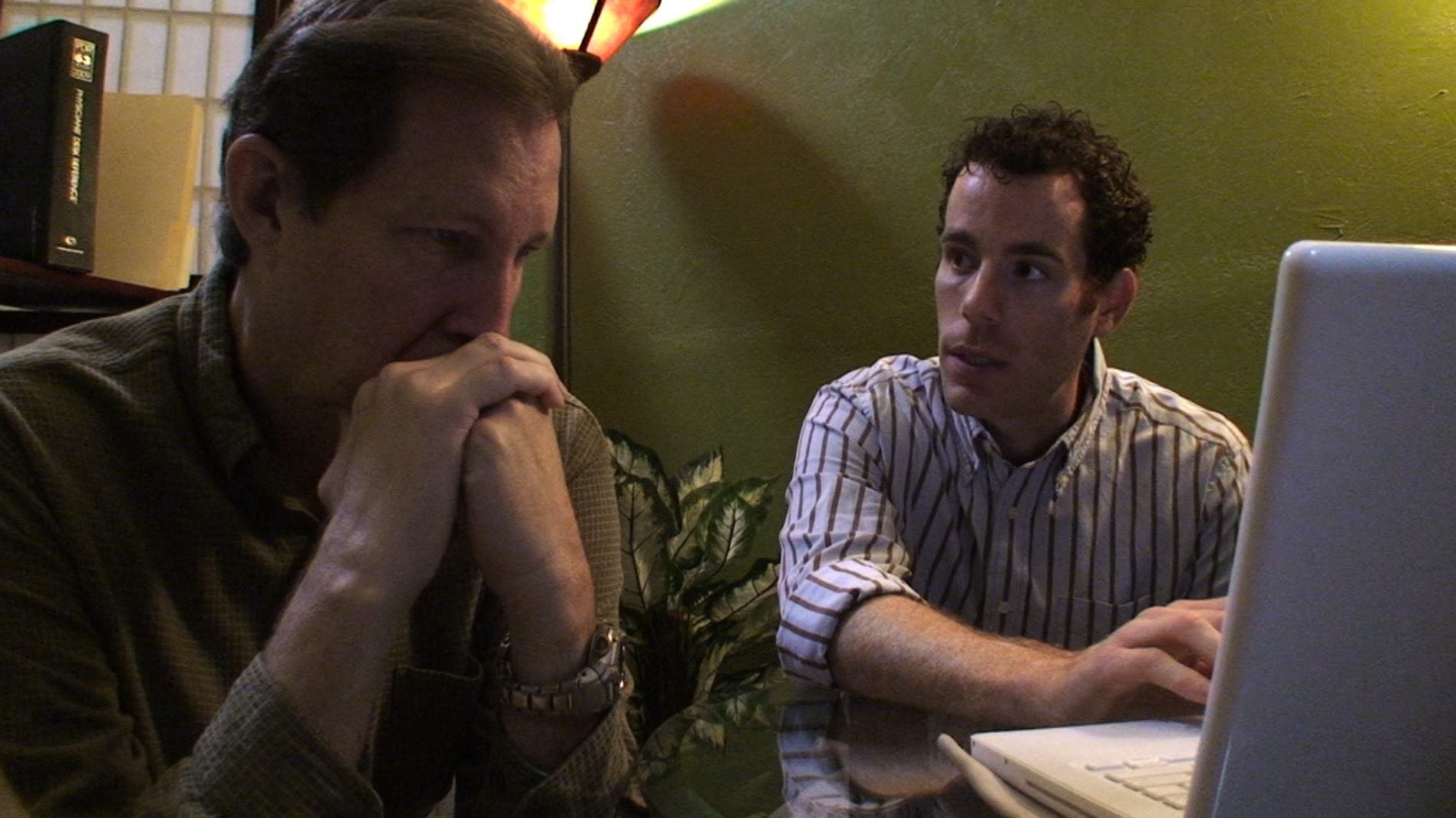
Lee Fulkerson (left) reviews his concerning lab results with Matthew Lederman, MD.
Fulkerson: At that point, my diet was strictly Carl's Jr. every day. Double cheeseburgers, onion rings, and strawberry cheesecake. So I changed that. I started eating big colanders of penne pasta with dairy-free pesto—that and a salad every night.
I had no idea where my cholesterol was going because we didn't take measurements during the six-week period. We just waited till the end. I was happily shocked by the whole thing. My cholesterol went down to 150. I dropped 100 points in six weeks.
Matthew Lederman, MD: It was exciting to see that and catch it on camera. Lee really put [his mind] to it and made the changes happen. [Then other members of the film crew] started going plant-based. I don’t know if they stuck with it, but they were trying. Because it’s hard to hear these stories and see these results and not want to make the changes yourself, even if you don’t do it a hundred percent. It was sort of contagious that way.
Firehouse Magic
Also featured in the film is Caldwell and Ann Esselstyn’s son Rip, a former professional triathlete and firefighter who helped his whole fire crew go plant-based, an experience he documented in the 2009 book The Engine 2 Diet. The FOK crew met Rip at his Austin, Texas, firehouse, where he climbed a firepole using just his arms, chanting, "Real. Men. Eat. Plants"—one of the most memorable moments in the film.
Corry: Rip did that spontaneously, and we got the shot from below. Afterward I said, "You think you could do that again, so we could get the shot from the top of you getting to the top?" I can’t imagine what his arms felt like.
Rip Esselstyn: And that was right after we did the pull-ups with air tanks on our backs.
Then we were eating a rice and beans extravaganza that we had just all made, and we got a tone for a car fire. So we went to the car fire and then on the way back, we got a call for a medical emergency—a diabetic emergency, I think. And [they] were able to capture all that on film.
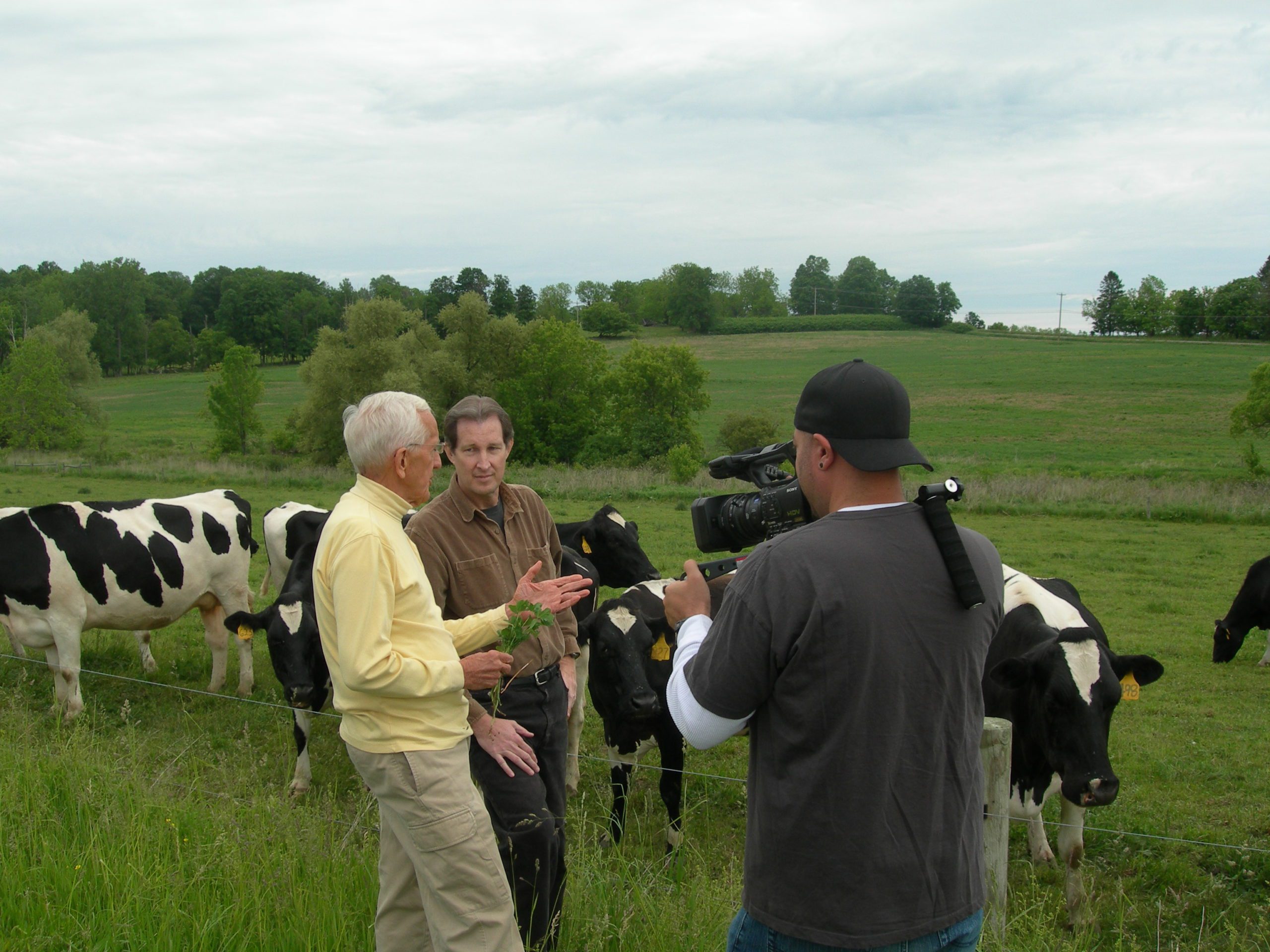
Lee Fulkerson interviews T. Colin Campbell, PhD, about dairy farm life in Ithaca.
Drama at the Dairy
The crew traveled to Ithaca, New York, to film Dr. Campbell at his home. After learning that the largest dairy producer in the state was located just a few miles away, they decided to try getting some footage outside the factory farm.
T. Colin Campbell, PhD: I remember they were in a pickup truck and had the film apparatus in the back of the pickup, and said they wanted to ride up and get a shot of that farm. So they had me go up to the top of this little hill, then come running down past the sign for the farm, because they didn't want to stand there and just take pictures just directly of the farm.
I was running down toward the truck, and all of a sudden the owner of the farm comes driving up—a big stout guy with his three-wheeler. He was angry. "What are you guys doing here?!" John made up a real quick story. “You know, we’re just... we're making a film about older people who like to exercise.”
Corry: That was the biggest guy I’ve seen in years—300 pounds, at least. Our cameraman, John Orfanopoulos, was scared to death.
Adventures in China
In late summer 2009, the crew and Dr. Campbell flew to Beijing, where they interviewed Junshi Chen, MD, who conducted the original China Study research with Campbell.
Fulkerson: Junshi Chen gave us this big banquet-type dinner at a very old restaurant in Beijing. All the dishes were plant-based. There were, like, 75 courses.
Wendel: Then we arranged to have a shoot in the rural community to get footage of rural Chinese people eating a plant-based diet. We were expecting a plant-based meal because we had told our Chinese liaison, obviously, this is a plant-based movie, but something apparently got lost in translation.
Fulkerson: When they’re giving a banquet to foreigners, they don’t serve vegetables, they serve meat.
Wendel: In Beijing, we had been getting a lot of fake meat and stuff like that, so you couldn't easily tell the difference. But as Lee and Colin started eating, they quickly realized it tasted a little too much like chicken.
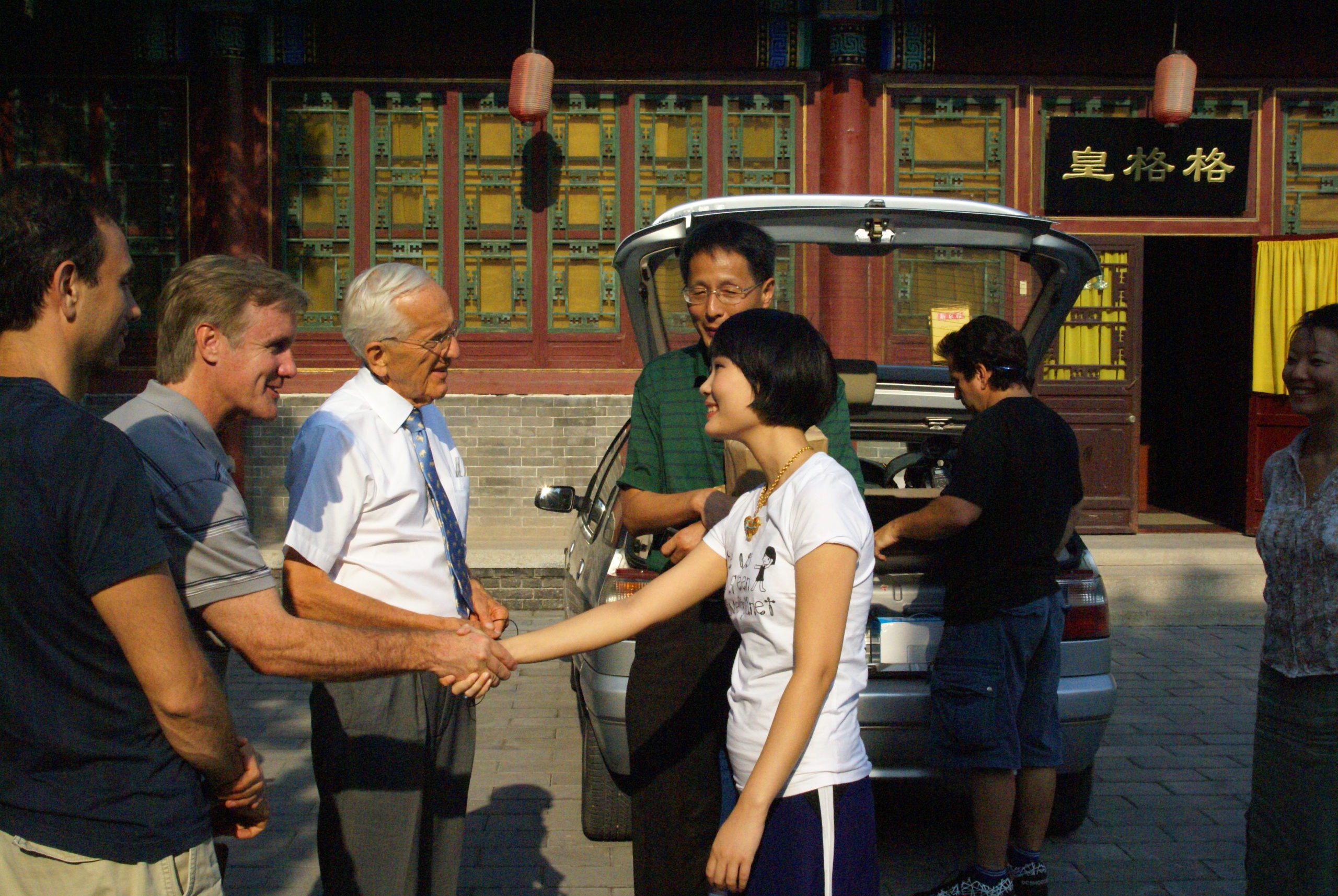
The team meets The China Study fans in Beijing.
The Final Scene
In fall 2009, with the end of production in sight, the crew began debating what the final scene of the film should be. Inspiration struck Wendel as he was driving through the streets of Columbus, Ohio, after filming an interview with Pam Popper and meeting Del Sroufe, a plant-based chef.
Wendel: We didn’t want the last scene to just be patients saying how great they’re doing. And then it hit me. Esselstyn always talks about the idea that the patient is the locus of control—that in a way, the patient is partnering with their doctor. I thought, what a great visual it would be to have patients and the doctors sitting around a table sharing a meal.
So Ann Esselstyn invited us to use their farmhouse in Cleveland. And we asked Chef Del to make the meal because he’d done some cooking for us when we were in Columbus interviewing Pam. And we really just loved his food.
Ann Esselstyn: Brian was very strict as to who was sitting at that table, but there was this huge crowd of [film crew] behind the table who were in the dark. It was sort of odd to be sitting there eating while you’ve got this crowd watching you eat... and there was no conversation. So all I could think of was to raise my salad bowl. It was such an off the top of the head idea, but it was kind of a cool salute to the movie.
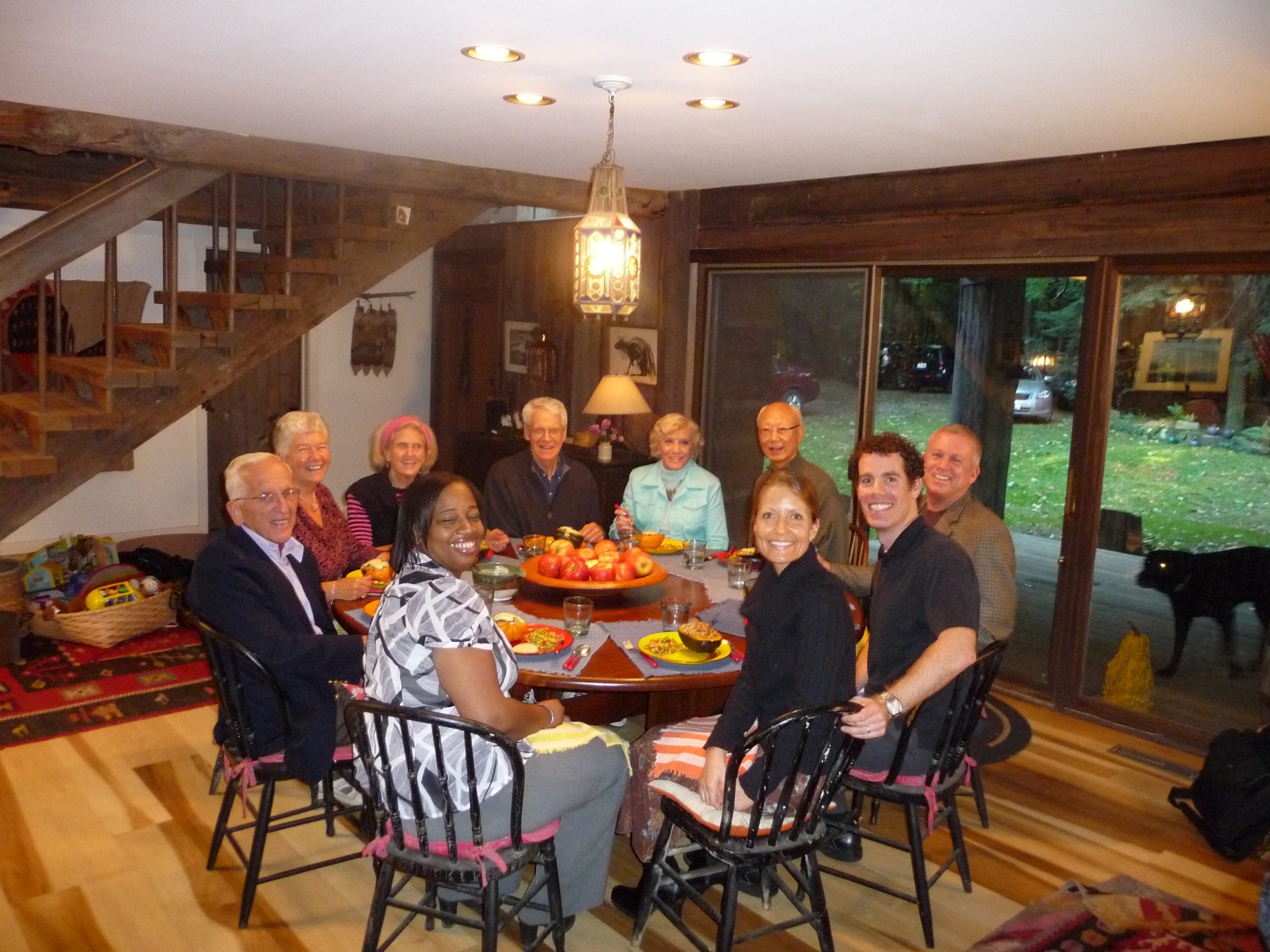
Clockwise from left: T. Colin Campbell, PhD; Karen Campbell; Ann Esselstyn; Caldwell Esselstyn, MD; Evelyn Oswick, Anthony Yen; Joey Aucoin; Matthew Lederman, MD; Alona Pulde, MD; San’Dera Nation
VI.
Screen Time
After months of test screenings and arduous editing, the film was ready for wider audiences. In fall 2010, the Forks team partnered with regional Whole Foods stores to organize advance screenings around the country, with Rip Esselstyn participating in post-screening Q&A panels.
Rip Esselstyn: I had started my partnership with Whole Foods as a healthy-eating ambassador in 2010. So we did this partnership with Whole Foods Market stores, Engine 2, and Forks Over Knives. I can remember in some cities we had waitlists of up to 500 people trying to get into these free screenings. If I’m not mistaken, we were in 40 different cities across the United States. It was just gangbusters successful.
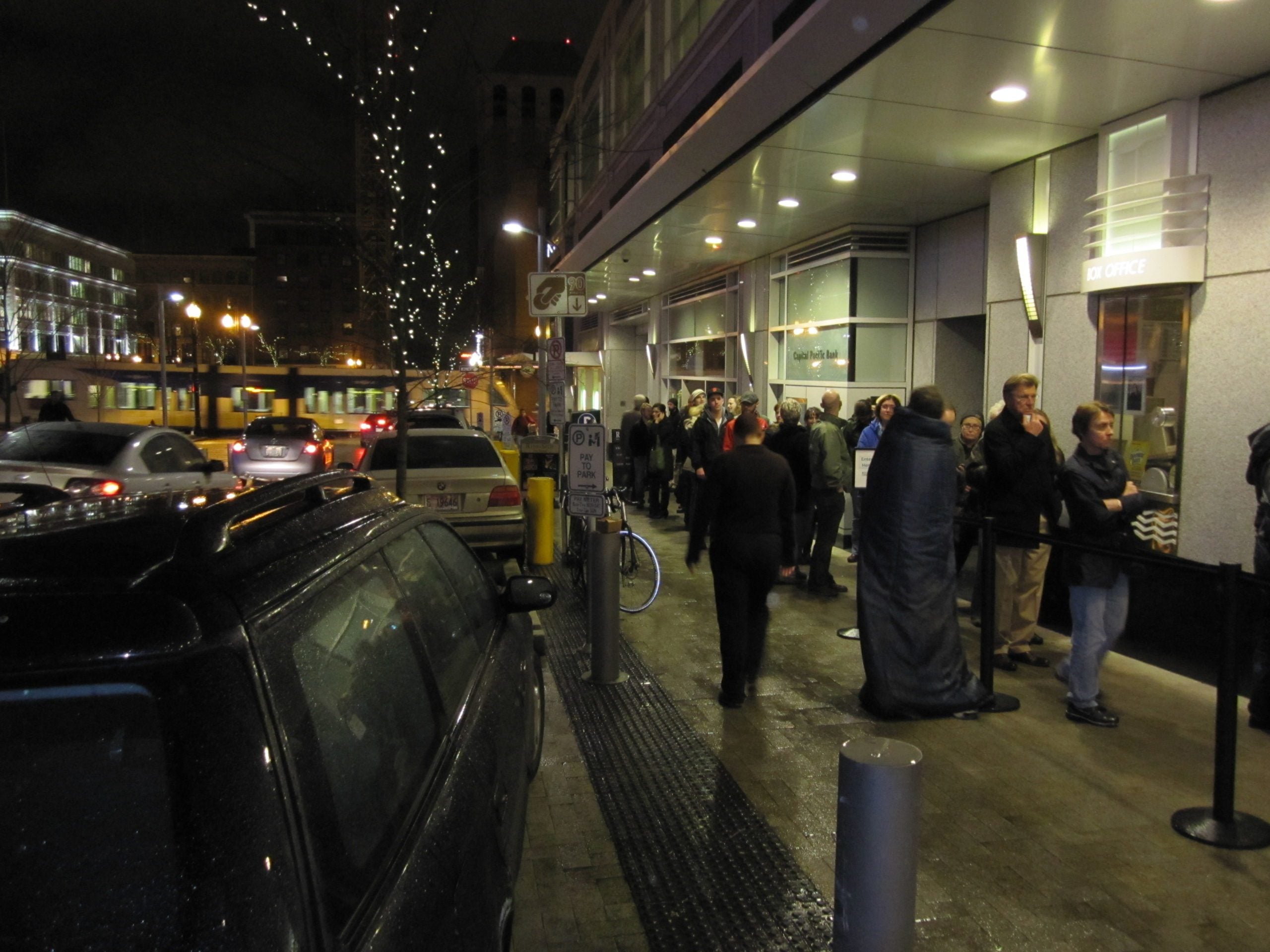
Moviegoers line up for the theatrical debut of Forks Over Knives in Portland, Oregon.
Wendel: I was in a lot of the screenings with Rip, but not all. But the first big one, Char Nolan [of the Whole Foods marketing team] put that together at the Bryn Mawr Theater in Pennsylvania. Char was calling me from the theater going, “You’re not going to believe this. We have a 550-person theater and we have people screaming outside that they can’t get in.” Char pulled together this amazing first screening that became the model for our entire early screening program.
Those advance screenings set the stage for a weeklong theatrical run at the Regal in Portland, Oregon. Almost all of those shows on that first weekend sold out. It was so successful that the independent theater chains—Cinemark, Landmark—were knocking on our doors after that. Following our premiere on May 6th, we had a theatrical run on over 90 screens nationwide.
VII.
A Legacy
Ten years after Forks Over Knives officially premiered, the film continues to find new audiences.
Neal Barnard, MD: I can't tell you how often I hear people say, “Oh, I went plant-based because of..."—and I can complete their sentence. They always say that it was Forks Over Knives. Or they'll say, “I heard it from my father, who saw Forks Over Knives,” or, “I heard it from my kids, who saw a movie called Forks Over Knives.” Forks Over Knives introduced to the general public the idea that food wasn’t just some modest force. It wasn’t going to just bring your cholesterol down a little bit or something like that. It was something revolutionary that could empower you to change your life dramatically—to save your life.
Ann Esselstyn: I just can’t believe that any of us could have conceived where it would have gone, what it would have done, how it would’ve changed the world.
Ruth Heidrich, PhD: I am frequently reminded how this documentary is still being passed around. A couple years ago, I was walking along a street and a woman stopped me and said, "Excuse me, weren't you in Forks Over Knives?” It turned out she was a doctor and always played the film in her waiting room.
Lederman: I remember [before Forks Over Knives] I was at Kaiser and I got my blood drawn and my cholesterol [had dropped to] the 120s. I told another doctor, and she looked at me and said, sort of with disgust, “What are you, vegan?” When Forks Over Knives came out, it was popular with the public right away, but it still took some time to get into the medical world. … Today, there’s all these doctors saying that they’re plant-based.
Alona Pulde, MD: That was the thing—it used to be either you’re vegan and kind of off the beaten track or you're mainstream. And now vegan, whole-food, plant-based has become part of the mainstream.
Wendel: Our work rests on the shoulders of Campbell and Esselstyn and all these pioneers. We popularized what they spent decades working on. Without them, there is no Forks Over Knives, no movement, no story to tell. I feel lucky that I was in the right time and place to be able to help tell it.
Forks Over Knives is now streaming for free. To learn more about adopting a whole-food, plant-based diet, visit our Plant-Based Primer. For meal-planning support, check out Forks Meal Planner, FOK’s easy weekly meal-planning tool to keep you on a healthy plant-based path.
Related News
Save 40% This WeekOn Forks Meal Planner

Forks Meal Planner takes the hard work out of making nutritious meals the whole family will enjoy.
SAVE $200 ON OUR ULTIMATE COURSE

Join our best-selling course at a new lower price!
